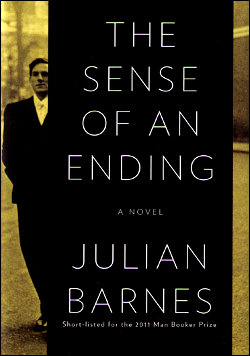 Yesterday, I read The Sense of an Ending
Yesterday, I read The Sense of an Ending (affiliate link), by Julian Barnes.
At 163 pages, it’s short enough that I’m tempted to read it again, to see if my feelings about it change.
The Quick Version
The book is about a group of school mates who go on to college and then onto their lives.
The second part of the book is the narrator looking back after receiving a letter that leads to learning more about things that happened back then.
The Awe of it All
I’d be lying if I said I wasn’t in awe by how masterfully Barnes handled the pacing in the first part of the book.
In a matter of pages near the end of the first part, he handles a passage of time in ways that left me floored! Just BOOM! “Well, that was about as perfect as it gets without feeling like he just forced the years on readers.”
The book is worth a read just to experience the pacing, language, and that passage of time in the first part.
Part Two
The second part of the book introduces some things that really hooked me. (For the sake of not spoiling it, I won’t go into specifics about those things.) But the past comes back in an interesting way; it made me love the book even more.
Then…there’s a whole lotta thinking!
I don’t mind getting into the narrator’s head. I don’t mind a narrator who thinks and shares their thoughts with readers. But at times, it was a bit, “Okay, we get it — you’re thinking about stuff!”
Not that it’s a book that’s driven by plot, but that first part really moves!
That pacing scatters a bit as we wander the narrator’s thoughts.
The Twist
I don’t know if I’d call what happens at the end of The Sense of an Ending a plot twist, or just a reveal. But since it was all held back like Barnes was holding the winning cards all along, I felt a bit like, “Hey — SURPRISE!!!”
I like surprises. I was okay finding out that Darth Vader was Luke’s father. But had that been the final scene of The Empire Strikes Back or the whole trilogy, I would have felt cheated.
There’s a twist in the final moments of The Sense of an Ending that made me feel a bit cheated. It was still good stuff, and perhaps calling it a twist is unfair because in some ways, it’s a logical reveal. But that it came right at the end — it was like somebody jumping out and shouting “BOO!!! See what I did, there?”
So…Should You Read It?
Despite feeling a bit cheated by the ending, with its length, I’d still recommend The Sense of an Ending to readers. The pacing in the first part of the book and glimpse into the lives of a group of people on the verge of adult responsibilities in England in the 60s flows! Even the second part contains some damn good stuff.
And maybe that twist at the end only seemed like a twist because it was late when I finished the book. And that’s a very telling thing: I couldn’t put the book down.
It’s short enough to read again…
And I might just do that.

Just commenting that I really appreciate your book review style, Chris. It’s genuine, open, and gives us potential readers a feeling for the book. I might just give it a read, but I DO dislike books with a twist at the end without several pages of resolution/tying up loose ends. It’s like watching the Shyamalan movies – tricking the viewer. Ugh.
I’ve read at least two Barnes novels, and I was impressed with the quality of the writing both times. This one sounds like another I’ll have to read.
M.E.: I still don’t know if I can call it a complete twist, but near the end, it’s all kind of, “Hey, this is what really happened back then!” I’m still torn between if I’d consider it a twist, or just where it was going from all along. If nothing else, it’s a testament to Barnes’s writing, because I’m really temped to read the second part of the book again.
I will say that if it is indeed a twist, it’s not a Shyamalan, “They were in modern times all along!” twist. The ending to The Sense of an Ending fits the feel and events in the story.
The more I think about it, my main complaint would be that the book moved along in a masterful way, and then in the second part it became a character thinking a lot, which had to happen. But in some ways — for me — it slowed things a bit.
Paul: It’s the first thing I’ve read by Barnes, and I will definitely read more. Without anything particularly exciting going on (i.e. “I’m dropping these scenes in for the sake of moving things forward), I couldn’t put the book down. It’s just…so well written. And the passage of time at the end of the first half was just so simple and natural.
There was a bit too much thinking for the sake of thinking in the second 3rd of the book for my tastes, but I still gave it 4 out of 5 stars on GoodReads, and now want to read more of his writing. What books by Barnes have you read? What do you recommend?
The one I can recall (without prowling through my old journals) is Arthur and George, and it’s a fictionalized account of a true story. The Arthur is Arthur Conan Doyle, and the George is a man falsely accused of a crime that Doyle gets him vindicated from.
Paul: I’ve been looking at Arthur and George. I have some other books to get to, but that would definitely be the next Barnes book.